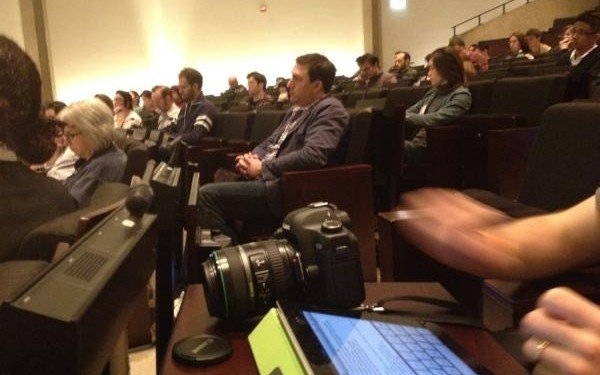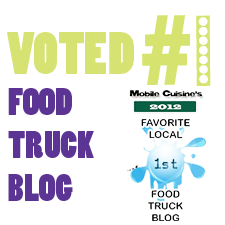On Saturday, the Institute for Justice hosted the first ever Chicago Mobile Food Symposium. They congregated people with various ties to the food truck industry: current food truck owners, aspiring truck owners, city legislators, lawyers, local restaurant owners and of course a bunch of food truck freaks.
There was a ton of information and great insights, but we’re going to give you a summary and key takeaways (and most re-tweeted quotes) from the event. If you want the deets, you can track back to April 14 in our Twitter feed (https://www.twitter.com/foodtruckfreak) and read our live tweets from the event.
For the first time, a huge group was gathered to hear the latest about food truck legislation but also to learn about the industry as a whole. The first panel was geared towards learning the story of food trucks on our national lanscape. John Gaber, professor at the University of Arkansas, pointed out that street vending is an older institution than the United States is. Sean Basinski (founder of the Street Vendor Project) pointed out the great need for quantitative data on the economic impact of street vending. Heather Shouse, author of Food Trucks, had the fortune of quitting her day job as a food writer to travel the country for a year and hear the stories of food truck owners nationwide, a reminder of the soul of the soul of this super niche community.
The next panel educated the audience on what the food truck scene is like in other cities. Justin Large of Big Star started by pointing out that food truck are a logical “pinnacle” to the culinary mecca that is Chicago. Alderman Willie Chochran used to be a police officer who frequented food carts, and now is on Team Food Trucks in terms of legislation. Vicki Lugo, VP of la Asociación de Vendedores Ambulantes [Association of Mobile Vendors in Spanish, or A.V.A.], is the voice of the Latino food cart owners who predominantly serve the Pilsen and Little Village neighborhoods. She spoke of government corruption in the form of city inspectors sprinkling Clorox on the cart owners’ food. She said they also face police brutality. Food Truck Freak follower @tellmedelmy substantiated the horrendous working condition claims; as a resident of one of these neighborhoods she knows some of these vendors well and says that they have felt increasingly safe over the years after Ald. Cochran and A.V.A. came to their aid. She pointed out the fact that these small businesses help keep them at home with their family and helps their income go to food instead of childcare, which is what would happen if they had to take a traditional job and put their children in daycare. Plus, their main hours of operation are 3-8 a.m. when people in these neighborhoods are headed off to work, and are off the streets before local brick and mortars open, thus not posing any competition.
Large, who owns both a food truck and a restaurant, observed that restaurant owners do not seem at all willing to have a discussion on the topic. Two restaurant owners have openly identified themselves as not supportive of changing food truck legislation, while the rest remain in shadows. It seems as though restaurant owners are counting on old school Chicago politics to continue to preserve their interests, but after attending this summit (especially the forthcoming panel discussion), it seems that strategy won’t pan out for too much longer. (Note, if you want to know exactly how many days the city of Chicago has been sitting on the first reform to this legislation, check out the IJC’s website for the official clock. At the time of writing this, it has been exactly 629 days, 10 hours, 47 minutes and 20 seconds).
The last panel discussion was, for many of us, the most hope-instilling panel. Word on the street is Bert Gall, the senior attorney for IJC and panelist on this discussion, has been nicknamed the patron saint to food trucks (by food truck owners). Hmm, what could earn a man such a title? It sounds like a lot to live up to, but after this seminar it seemed like a modest one. Like many attorneys, Gall is sue-happy. However, in this case that trait takes on a heroic overtone. He said that sometimes, when a party is so in breach of the law, you “just have to sue the bastards.” He said:
The city cannot bargain away the right of street food entrepreneurs to earn an honest living in order to protect established restaurant interests from competition. The city does not have the power to do that under the 14th Amendment, which guarantees to all Americans the right to earn an honest living free from arbitrary government interference.
The “arbitrary government interference” is the extreme protectivism over a particular business model (brick and mortar restaurants). An audience member asked why we haven’t sued the city yet, in that case. To that, Gall responded “Stay tuned.”
(I want to end the story there because it just feels right. That is the note that the meeting ended on, and is the quote that gave the oppressed entrepreneurs a glimmer of hope for fair treatment and us food truck freaks the tasty smell of food truck heaven just in front of us. However, the day continued and so must this story.)
By this time we were all starving and walked outside to see what looked to be a mirage. Oh no, it was not. There were, in fact, 12 trucks already parked and serving food and more were to come. Fellow food truck freaks know that this is the second time so many food trucks were in one place here in Chicago (the first being last year’s food truck festival).
(Foodie detour: we had a chance to try a new dish that we’re obsessed with. @uchinomgo introduced us to the amazingness that is ptacky, a Czech dish served by Chicago Schnitzel king; it’s red pepper and onion wrapped in bacon wrapped in beef. It’s the size of sushi and, in a word, word, heavenly.)
Several trucks sold out within the first hour, Duck n Roll and 5411 seemed to tie for Longest Line award, and alas we were all able to mingle and foster the sense of community that we only get a taste of when we wait in line for these trucks on their normal weekday stops.
Thank you, Institute for Justice, for hosting this event. Moreover, thanks for fighting the good fight.
Anyone else suddenly hungry for an empanada or a cake ball?





Pingback: Food Trucks Now: What Lexington Needs | Ace Weekly
Pingback: Keefer’s Food Truck Argument is Misses Many Marks
Pingback: Debunking & Contextualizing Claims About Proposed Chicago Food Truck Ordinance Amendments